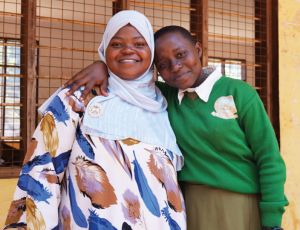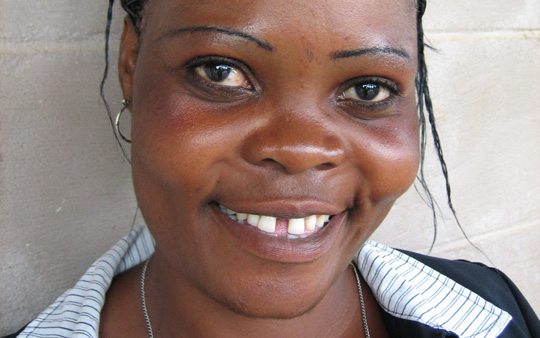
When she thrives, we all thrive
Together this giving season, we can make a difference that ripples outward to benefit everyone.

Camfed International’s Catherine Boyce is blogging from Zambia during the ongoing biannual 10,000 Women Leadership and Enterprise Training Programme.
“You’ve got fat and look very well!” is how Bertha greets me on our first day together in Mpika, a lush, green district in northern Zambia. It’s a warm and sincere compliment from the 27 year-old woman who was born to a family of eight children and grew up unsure of where the next meal was coming from and whether she would have enough to eat.
Today this young woman is the breadwinner in her household. Her husband died in a tragic car accident in 2005, leaving Bertha a 21-year-old widow with a baby to care for. She also supports her younger brother and sister and her niece from an older sister who passed away. All of them, she is proud to tell me, attend school. For several years Bertha was the lifeline for her father who had a long-term illness and required frequent hospitalization and medicines. Bertha’s only source of income is profits from her business and, naturally, she places a high value on her business success.
Bertha joined Camfed’s 10,000 Women training programme in order to gain skills to grow her business. Her experience is that of a cautious but savvy entrepreneur who understands her market and has steadily and surely grown her business – and saved a share of the profits – over several years.
After participating in Camfed’s Seed Money Programme in 2007 Bertha used the new skills she learnt, and a $50 grant, topped up with her own savings, to start a successful rice-selling business. She ran that business for two years before applying for a small loan from Camfed. It is with that capital that Bertha started her current business retailing shoes, hair extensions and clothes. She focused on shoe retail because she observed that her rural customers – who walk long distances on a daily basis – wear through shoe leather rapidly and that the business can be profitable despite heavy competition. “Sweety B Boutique” as she proudly named her enterprise operates from a market stand in central Mpika.
Bertha tells me, with excitement, how the 10,000 Women Programme has helped her to hone her business skills – not least to know how much profit she is actually making. As she tells me, “before I knew it [the profit] was there, but now I know how to calculate it accurately using a profit and loss account. It helps me with planning what I spend and how to grow my business.”
She has also learnt the importance of separating her business finances from her personal finances “because if you don’t separate the two you risk touching the business capital when buying, for example, a skirt and then you run down the business.” Bertha recognizes the value of networking as much as any seasoned MBA graduate and has used the opportunity of meeting other entrepreneurs running similar enterprises through the training to collaborate and negotiate bulk purchases of stock from suppliers.
Bertha’s entrepreneurial instincts shine through. She was inspired by our exploration of the concept of added value during the training and immediately saw the opportunity in the processing of local agricultural produce. She is convinced there is market for peanut butter in Mpika – not just as a spread but to season vegetables and other savoury dishes – and her market research confirms the demand as well as the absence of local competitors. She has a firm eye on her costs and she tells me the best time to launch such an enterprise would be in July when the groundnut (as peanuts are called in Zambia) harvest is complete and produce at its cheapest.
Despite her sense of the opportunity, I sense that Bertha is worried about risking her savings on the procurement of expensive equipment for business growth. Her cautiousness is understandable given the consequences of business failure in the rural African village. However, this cautiousness can lead to missed opportunities, especially with young women as talented as Bertha.
At Camfed we’re testing how we can mitigate some of the risks young African business-women face, and support them to pursue innovative businesses that meet consumer needs in new ways in their communities while generating sustainable employment and profitability. The ideas we have in mind include solar lighting and power, clean cook stoves and initiatives to increase agricultural productivity and food security. My conversation with Bertha certainly leaves me energized and inspired!
Michelle Brown $16.1
Justin Coffey $474
Jenifer Fabian $10.9
Laurence Pearl $185
Nicole Duncan $209
The LockPhantoms $253
Rachel Epstein $180
Alexandra Ornston $500
Shanice Lodge $141
Deb Williams $10.9
Kendra Cullen $158
Maggie Cutkosky $106
David Pederson $79.2
Lauren Frankel $52.9
David Shilling $106